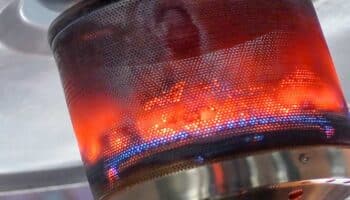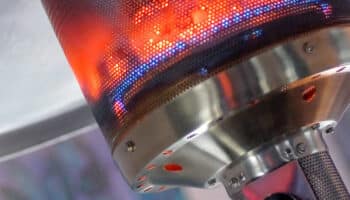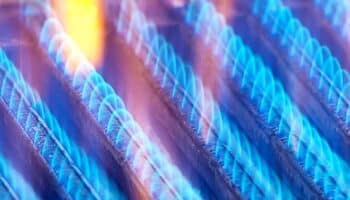We've independently reviewed this article to make sure it's as accurate as we can make it.
To find out more about our article creation and review process, check out our editorial guidelines.
Are you worried about your safety while using a propane heater?
Don’t worry, this is a common concern. Although propane heaters can be your backup if the power goes out or if your furnace isn’t working, sometimes using them safely and effectively can be tricky.
Luckily, you’ve come to the right place for answers.
If you use them properly, propane heaters are safe to use indoors: but you need to follow some simple safety tips. If your heater needs venting, make sure to always have good airflow throughout your space. Remember, propane is flammable, so you need to exercise caution when choosing and using your preferred propane heater.
Read on for more detail on how to use a propane heater safely – especially indoors.
Are Propane Heaters Safe Indoors?
Yes, you can use some propane heaters indoors safely! There are two types of propane heaters: indoor and outdoor.
Using a propane heater indoors is safe if you use the right model.
Otherwise, your outdoor-only propane heater needs to be outside or somewhere with plenty of ventilation (like a garage) and a carbon monoxide detector.
There’s a good reason to double-check what kind of propane heater you get. Indoor and outdoor propane heaters handle the smoke they create very differently.
Using an outdoor-only propane heater somewhere without serious ventilation can lead to carbon monoxide poisoning.
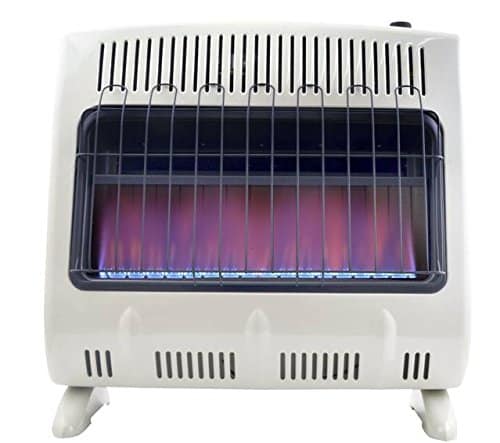
Differences Between Indoor & Outdoor Propane Heaters
The main difference between outdoor and indoor propane heaters is how they take care of smoke. Burning anything makes a lot of different byproducts, and propane is no different.
While it’s always better to avoid breathing in fumes, there’s one particular gas that will cause problems indoors: carbon monoxide.
Carbon Monoxide and Propane Heaters
Carbon monoxide (CO) is a serious health risk. The problem is that it is clear, tasteless, and odorless. It also takes a while to build up. Put that together with the mental fuzziness carbon monoxide causes, and it’s a recipe for disaster.
To help, propane manufacturers actually include a stinky smell in the gas. They add it themselves, so that we know there’s something wrong if there’s a leak!
Burning propane always results in carbon monoxide being made. However, carbon monoxide is easily blown away by natural air currents. Because of this, outdoor propane heaters don’t need to really do anything about the CO they produce. Wind will just blow it away before it can build up to anywhere near a dangerous level.
Indoor propane heaters, though? That’s a different situation.
Since they are designed to be used in enclosed spaces, the CO they produce has nowhere to go. To fight this problem, indoor heaters come with automatic shutoff switches.
These switches are connected to oxygen sensors – if there’s not enough oxygen in the room, the heater shuts off immediately. This helps prevent CO from building up to dangerous levels.
Some indoor propane heaters also come with carbon monoxide detectors. These detectors should be placed at least several feet away from the heater. By keeping the heater and CO detector separated, you get a more accurate reading of the CO in the room as a whole.
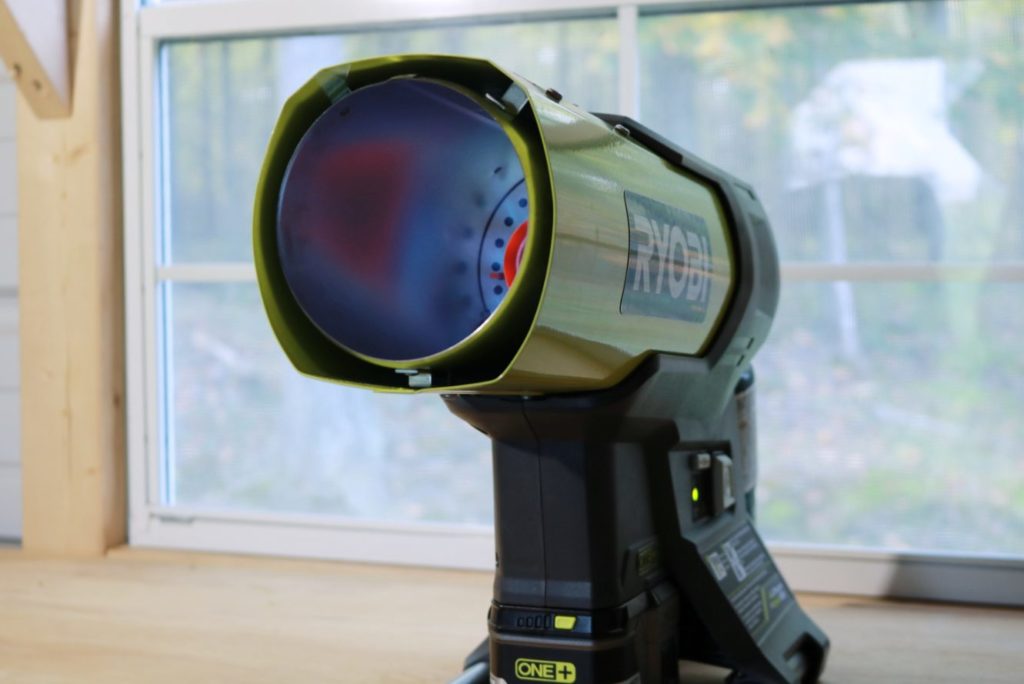
Are Propane Heaters Safe In A Garage?
Propane heaters can absolutely be safe in a garage. Even outdoor propane heaters can be used in a garage, as long as the door is wide open.
This will let the CO escape outside, while the heat remains inside with you.
If you’re using a propane heater in a garage, it’s important to watch out for stuff surrounding the heater. Any heater can be a fire hazard if it’s surrounded by flammable objects.
Keep your propane heater away from garden chemicals, other propane tanks, gasoline, or lawn clippings and flammable materials. This will help you prevent an accident that could seriously hurt your garage.
8 Simple Propane Heater Safety Tips
There are some general safety tips that will help you keep warm whenever you need it. By taking care of your propane heater, you’ll never face a real problem with your heater.
#1 Install a Carbon Monoxide Detector
The first thing you should do if you’re planning on using a propane heater inside is to get a carbon monoxide detector.
These handy devices will keep an eye on your CO levels for you. If they ever approach anything worth being concerned about, the CO detector will alert you, just like a smoke detector.
Detectors give you peace of mind: knowing that even if something goes wrong, you’ll know about it.
#2 Leave a Window Open
Leave a window open? When you’re trying to warm up a room? It’s smarter than you’d think.
Keeping your window open a few inches provides a vent for carbon monoxide to get out.
It’s also a small enough space that you’ll keep much more heat inside than you’ll lose. By venting the CO, you’ll be able to safely run your propane heater inside for longer. That will keep you warmer in the long run!
#3 Turn Off the Heater If You Smell Anything Weird
Carbon monoxide is odorless and tasteless, but propane isn’t. If you smell anything strange, turn off the heater immediately.
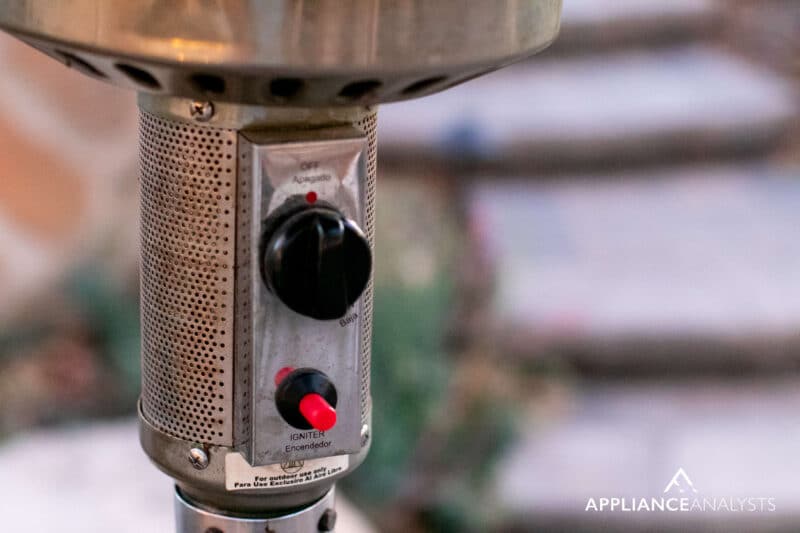
Then you can open windows and inspect the system for leaks safely. It may not be your heater at all, but it’s always better to be safe than sorry.
#4 Never Leave a Propane Heater Unattended
A safe propane heater is one that you keep an eye on. It’s all too easy for a pet, child, or gust of wind to knock over your heater if you’re not around.
Instead, stay nearby while the heater is running. It just makes sense to stay nearby, too. After all, that’s where all the warmth is!
#5 Get a Heater with a Tip-Over Safety Switch
The biggest risk for most heaters is the chance of tipping over. CO is easy to vent, but if your heater tips over and keeps running, you’re at risk of a fire.
That’s why many heaters come with a tip-over safety switch. This turns off the heater immediately if it isn’t solidly on its base.
By turning off if it’s tipped over, the propane heater prevents any fires from starting. That can help you stay comfortable and safe in any conditions.
#6 Only Run Your Heater When You Need It
The easiest way to keep your propane heater safe is to use it only when you need it. That keeps wear and tear down on your heater, so you have less to stress about.
By turning off your heater every few hours when you’re warming your space, you also let CO dissipate, save propane, and give the heater a break. It’s a win all around.
#7 Check Your Heater for Leaks Regularly
Taking care of your heater helps guarantee it works perfectly for years to come.
Maintenance on a propane heater is simple. Keep it clean and dust-free, so there’s nothing on it that can overheat.
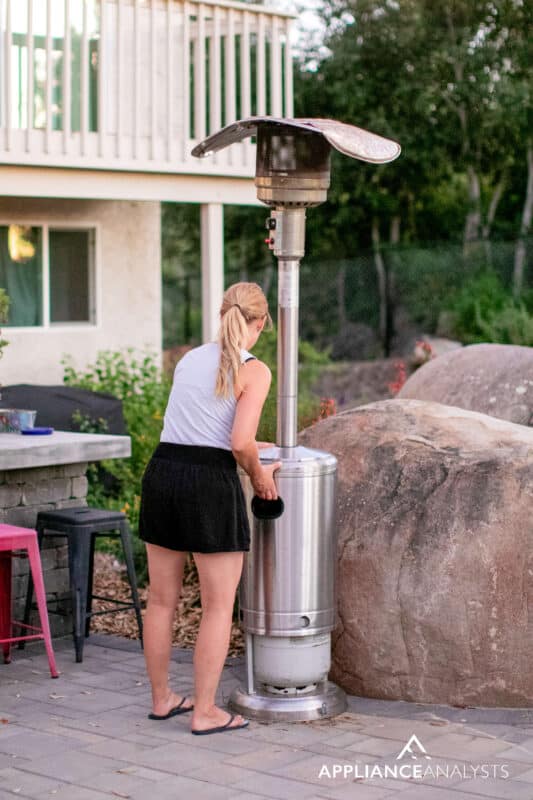
Then check the system for leaks. A propane leak can be just as much of a problem as a gas leak, so you want to be on top of this.
To check your heater for leaks, look over all the hoses and connections. You’re looking for cracks, faulty seals, or anywhere else a gas could escape.
If you’re not sure, there’s a trick you can use:
Get some soapy water or diluted dish detergent and wipe it over any parts of the heater you’re suspicious of, then turn it on. If there’s a leak, the soap should start to bubble at the place the gas is escaping.
Once you know where the leak is, you can patch it, replace it, or get a technician to repair it.
#8 Store and Move Your Heater Properly
Proper heater maintenance includes taking care of it when you’re not using it. Most heaters should only be stored and moved while upright.
Tipping them over or storing them sideways can jostle loose internal connections.
You should also disconnect any tube and fuel sources when the heater isn’t being used. That minimizes the chances of any leaks happening.
Taking propane safety seriously is the best way to keep you and your stuff safe.
How to Handle Propane Safely: 5 Simple Tips
Propane itself is perfectly safe when you store and use it correctly. This is why I’ve created the following list of 5 tips to ensure that you’re using yours the right way.
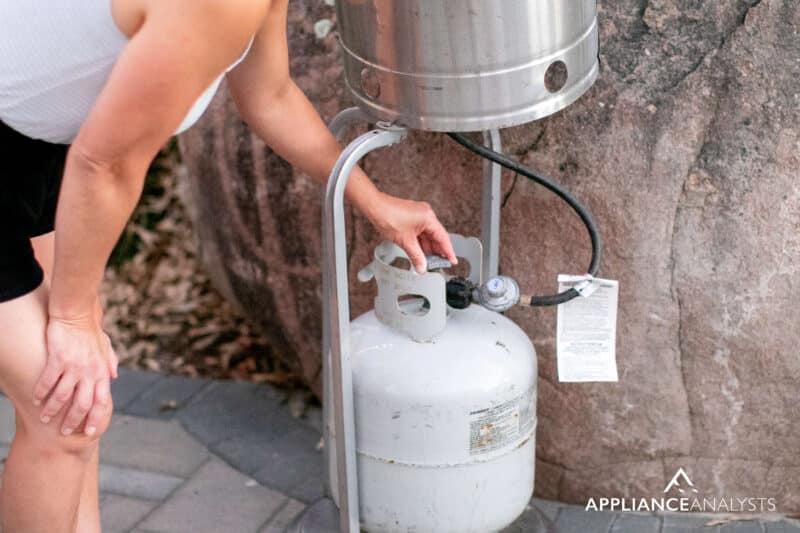
- Never store propane tanks inside. If a canister has even a slight leak, storing propane inside is a fire hazard. Instead, keep your propane tank outside and away from any electric lines in the area.
- Keep propane far away from any embers, sparks, or open flame. Propane is extremely flammable! It’s just smart to keep any ignition source far, far away from your propane canisters.
- If you smell gas, close the valve and call a professional. If you think your propane canister is leaking, tighten the valve as much as you can. Then get everyone away from the canister and call a professional to check it out. They will be able to safely perform any fixes that need to happen.
- Store propane canisters upright. A sideways propane tank put the valve at risk of damage. That can lead to leaks, fires, or potentially an explosion.
- Only fill canisters to 80% of capacity. Propane expands and contracts depending on temperature. By leaving 20% of your tank’s capacity available, you give it room to handle big temperature swings easily.
Conclusion
That about covers it!
If you take anything away, please remember that propane heaters are incredibly useful and can be safe if used under the right conditions.
As long as you take care of your propane heater, it will take care of you.
Don’t forget to perform regular maintenance, keep your area ventilated, and treat propane and carbon monoxide with respect, and you’ll stay warm in any situation.
Have a great rest of the day!





